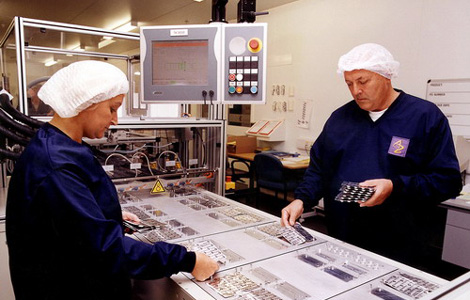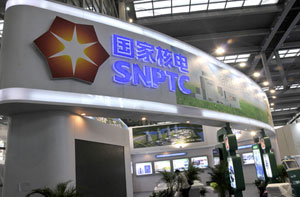AstraZeneca to build $200m center in China
Updated: 2011-10-12 09:56
By Ma Zhenhuan (China Daily)
|
|||||||||||
|
 AstraZeneca PLC workers load blister strips onto a packing line at a factory in Macclesfield, United Kingdom. The UK-based medical company will create 600 jobs by building a new factory in Taizhou, Jiangsu province. [Photo / Bloomberg] |
SHANGHAI - AstraZeneca PLC, one of the world's leading pharmaceutical companies, said it would invest $200 million to launch a new manufacturing facility in China to meet growing demand, including in rural areas.
Construction work on the project, in the China Medical City in Taizhou of East China's Jiangsu province, is scheduled for completion by the end of 2013, creating approximately 600 jobs.
This will be London-based AstraZeneca's largest single investment in a manufacturing facility globally. The new plant will produce intravenous and oral solid products, the company said.
"The new facility will significantly enhance our capacity and allow us to meet the growing healthcare demand of the Chinese population, and help us expand into the 900 million (rural) people outside of the big cities and hospitals," Mark Mallon, president of AstraZeneca China, told China Daily in an exclusive interview on Monday.
"It will also allow us to free up some capacity at our existing manufacturing facility in Wuxi, Jiangsu, to bring on more new innovative products that will be launched over the next few years," he added.
The Chinese pharmaceutical market grew from $10 billion in 2004 to $41 billion in 2010, according to market research agency IMS Health Inc, and it is expected to reach $102 billion by 2015.
Mallon said that he believes the Chinese government's focus on healthcare reform and investment in improving healthcare infrastructure and expanding insurance coverage will continue to drive the company's business growth and increase access to quality medicines over the longer term.
AstraZeneca will launch two new products, Faslodex, a treatment for breast cancer, and Onglyza, a new treatment for Type-2 Diabetes, in China this year.
Mallon also mentioned that the company is planning to launch Brilinta, an oral antiplatelet treatment for acute coronary syndrome, next year in China.
With an enhanced manufacturing capacity and the launch of more innovative new medicines, the company is planning to produce more affordable medicines for Chinese patients. It will adopt a multi-channel approach to sell its products to markets beyond big cities and hospitals.
Aside from the medical sales representatives who deal with individual physicians in big cities, the company has developed a team of about 100 customer service representatives who organize educational programs for small clinics and community health centers in China's rural areas.
It will also set up an inbound and outbound call center to reach out to healthcare professionals through phone calls, helping them learn more about AstraZeneca products, he said.
The company, which entered China in 1993, has invested about $500 million in the country, including an innovation center in Zhangjiang, Shanghai.
Related Stories
AstraZeneca relies on partners 2011-09-23 09:29
AstraZeneca appoints new vice-president 2010-12-17 14:21
AstraZeneca 'mulling partnerships' 2009-12-11 08:02
AstraZeneca steps up presence in China 2009-03-02 07:56
- AstraZeneca to build $200m center in China
- WTO talks at the crossroads
- China buys Japan debt as crises in West grow
- Currency act shortsighted
- Bailout of Wenzhou private firms starts
- Farm produce prices slightly up last week
- Energy links with Russia strengthened
- Nike to invest in China 'very aggressively'













